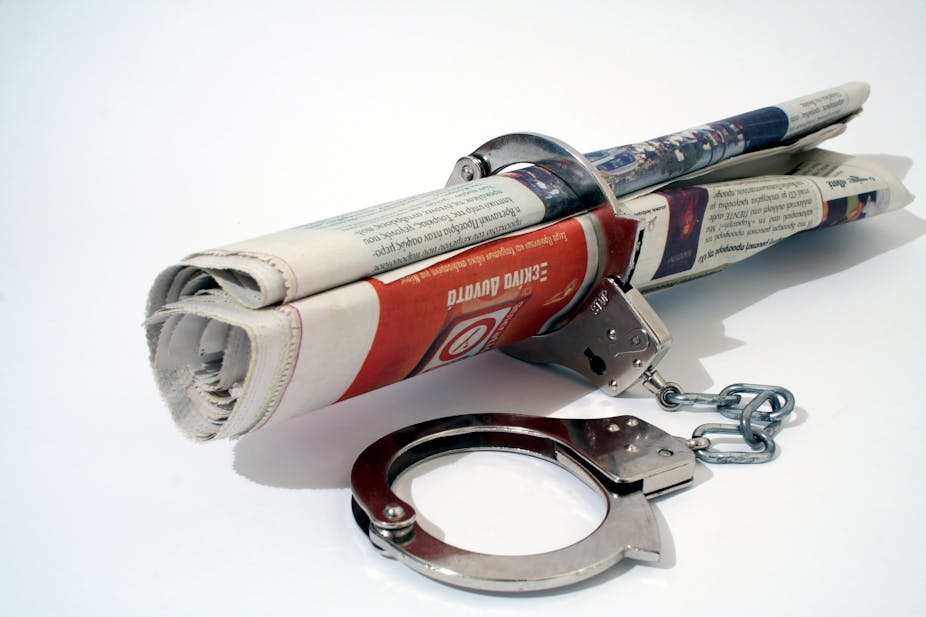Two incidents have stressed the fragility of free speech in Britain in the face of police use of anti-terror legislation to seize materials from journalists and academics.
The Independent has reported that British police used the Prevention of Terrorism Act to seize the laptop of Newsnight journalist, Secunder Kermani – who has conducted a series of online interviews with western-born jihadists. According to the BBC police were reacting to communications between the journalist and a man in Syria who was publicly identified as an Islamic State extremist.
Hot on the heels of that report, came the news – also in The Independent – that police used the same legislation to demand the release of video material from King’s College London. KCL had initially declined to hand over a video which was stored in its International Centre for the Study of Radicalisation (ICSR) so the police used the Terrorism Act to secure a court order compelling King’s to release the video.
The actions of the police have been widely condemned. In a series of reports on the issue, Press Gazette quoted a number of sources who expressed alarm at what had happened.
Gavin Millar QC, who has previously written that routine government surveillance of journalists’ communications breaches international law, told Press Gazette that he had heard of three cases in which “forces have threatened to use – but not used – the Terrorism Act in this way in stories involving young men who have travelled to fight in Syria and Iraq before returning to Europe and the UK”.
Millar stated that he feels these stories may be under-reported. He said: “Are we not learning about these stories through journalists because of… anxiety that you’ll get an application under the Terrorism Act? So it’s a chilling effect issue.”
Michelle Stanistreet, general secretary of the National Union of Journalists, argued that police attention in these matters was making the lives of journalists very difficult, to the point of potentially compromising their safety. She told the Press Gazette that, yet again, the police were:
Riding roughshod over press freedom and using anti-terror legislation to get their hands on journalistic information … Terrorism laws should not be used as convenient cloaks to sidestep measures that protect press freedom and the ability of journalists to inform the public and to hold power to account.
Poisonous atmosphere
The association between the police service and the media has never been more fraught. Veteran crime correspondent Duncan Campbell wrote in 2013 that the post-phone hacking, post-Leveson era is one where the relationship has a “noticeable chill”. He quoted Sean O’Neill, then crime editor of The Times, describing the “really poisonous” atmosphere that exists.
John Twomey chairman of the Crime Reporters Association (CRA) also told Campbell:
The chilling effect began before Leveson got under way but his inquiry helped turn a chill into a freeze. Detectives who were quite willing to discuss a wide range of issues with crime reporters are now reluctant to meet – in some cases even to return phone calls. Even press officers, whose job entails fostering good relations with the media, are wary of talking informally to reporters either on the phone or face to face.
Among journalists there is certainly the feeling of victimisation. As of August 2014, more than 100 journalists had been questioned by police on suspicion of crimes and as of June this year 66 had been arrested or charged. Added to this there have been 11 different task forces engaged in the investigations, calling on the skills of more than 100 officers at a cost of £33.5m.
But according to journalist Jon Slattery damaging though these cases have been, it is the implementation of the Regulation of Investigatory Powers Act 2000 (RIPA), which regulates the powers of public bodies to carry out surveillance and investigation, that has caused the greatest damage to press/police relations.
Designed as weapon against terrorism and organised crime it has, states Slattery, been used to identify journalist’s sources without their knowledge. He writes:
It is the provisions of RIPA coupled with the technology that allows mass snooping on emails and phone records that threatens the first commandment of journalism – you never betray a source.

Dominic Ponsford sees RIPA as being another step along the road which will eventually lead to the death of investigative journalism. Writing in the Independent in 2014 of a “national scandal” he stated that as soon as police and other public authorities started secretly viewing the phone records of journalists and newspapers it was a big problem for a democratic society.
In the Spectator, Nick Cohen highlighted that the opportunities for the abuse of power were limitless:
RIPA not only allows the police to seize everything a modern phone can tell them about the movements and contacts of a citizen without judicial approval, but it also contains no provisions to protect the confidentiality of exchanges between journalists and their sources, doctors and patients, lawyers and clients, and MPs and constituents.
And now we’re seeing academics in the firing line. Arguably academics perform an even more sensitive task than journalists as they seek to get inside the minds of would-be jihadists and understand the rapidly morphing forms of extremism that could threaten social cohesion in Britain. They must be allowed to do their jobs.

